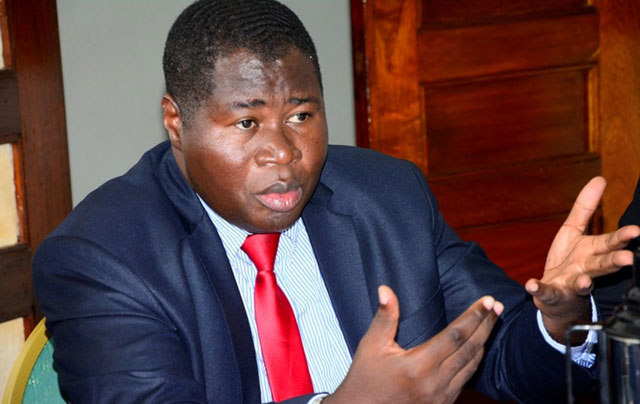
Kampala, Uganda | THE INDEPENDENT | Legislators sitting on the Legal and Parliamentary Affairs Committee want government to provide additional funding totaling 235.5 billion to the Judiciary in the coming financial year 2021/2022.
The funding is to cater for operationalization of newly gazetted courts, transport equipment, implementation of new staff structure, construction and renovation of courts, innovation in case management and disposal of cases.
According to the report by the Legal and Parliamentary Affairs Committee on the Budget Framework Paper for financial year 2021/2022, the budget for the judiciary is projected to remain the same at 195.06 billion Shillings. The wage bill is allocated 58.42 billion Shillings, non-wage 115.63 billion Shillings and Development budget 21.01 billion Shillings.
While presenting the report before the Parliament’s Budget Committee, Jacob Oboth, the Legal and Parliamentary Affairs Committee Chairperson said that the judiciary in the coming financial year plans to dispose of 120 cases in the Supreme Court, 970 cases in the Court of Appeal and 29,180 cases in the High Court.
He however said that the availed budget to the third arm of government is insufficient.
“The Committee observed that the instrument creating new courts was signed by the Minister of Justice and Constitutional Affairs and requires additional human resource and enabling facilities. The operationalization of newly gazette courts will increase access to justice by reducing the lead time and reduce case backlog as well. This will require 13.64 billion starting financial year 2021/2022,” said Oboth.
He recommended that an additional 10 billion Shillings should be provided to the institution so that the Judiciary implements the newly gazetted courts and recruit the required human resource. Oboth also recommended another 10 billion additional funding out of the required 70.7 billion for the Judiciary to procure vehicles to enable judicial officers attend to locus cases especially for land matters.
Recruitment of Judicial Officers MPs also recommended that the Judiciary wage bill be adjusted by an additional 71.6 billion Shillings to recruit 150 judicial officers in an effort to reduce case backlog.
The Judiciary was restructured to meet increased demand for services and as a result, the High Court judges increased from 60 to 82 in order to match the increase in High Court Circuits from 14 to 20 and the increase in magisterial areas from 42 to 82 will require an increase in Chief Magistrates from 43 to 100 and Magistrates Grade One from 276 to 532.
Despite the committee recommending a wage bill for an additional 150 judicial officers, the Judiciary in its request to the committee had planned a recruitment of 365 judicial officers and these include 57 Chief Magistrates, 256 Magistrate Grade One, 28 Deputy Registrars and 24 Assistant Registrars in order to reduce case backlog. In its request, the institution required an additional funding of 174.35 billion Shillings under the wage bill.
Construction of Courts MPs want government to provide additional funding of 3.42 billion Shillings for the construction of the High Courts and another 8.125 billion to construct 4 Chief Magistrate Courts in Alebtong, Ntoroko, Lyantonde, Budaka and Bubulo and 3 Magistrate Grade one Courts in Abim, Bwera and Patongo.
Innovation and Case Disposal The Legal and Parliamentary Affairs Committee also recommends that 2.713 billion be provided to operationalize the Case Management Information System to replace the manual system of handling files and stamp out corruption. The Committee says that a consultant has already been procured to install the system but the management system infrastructure needs to be procured, procurement of computers and scanners.
Meanwhile, the MPs also recommend that the Judiciary establishes mechanisms to increase the disposal rate of cases and that government should provide an additional funding of 129.67 billion to enhance case disposal rate at all court levels.
According to the committee report, the disposal rate of commercial cases is currently at 35 percent while that of land matters is at 27 percent. The report noted that the average time taken to dispose cases at various courts is extremely high at over 1,000 days on average, affecting the cost of doing business in the country and access to justice.
“At Supreme Court level, it takes an average of 1,036 days to conclude a case; while at Court of Appeal and High Court, it takes an average of 1,572 and 802 days respectively.
At Magistrate Courts it takes an average of 325 days. This has created huge case backlog in the Judiciary. In order to reverse this trend, an additional 129.67 billion shillings is required to increase the disposal of cases at all court levels,” reads the committee report.
Patrick Isiagi, the Budget Committee Vice Chairperson supported the report saying that the issue of having more courts across the country and the required judicial officials was important to bring justice near the people. The same sentiments were expressed by the Bududa Woman MP Justine Kayinza.
********
URN
 The Independent Uganda: You get the Truth we Pay the Price
The Independent Uganda: You get the Truth we Pay the Price



